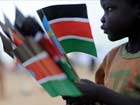| Videos | ? Latest |
|
? Feature | ? Sports | ? Your Videos |
'Independence' baby signals South Sudan

 0 Comment(s)
0 Comment(s) Print
Print E-mail
China.org.cn, July 20, 2011
E-mail
China.org.cn, July 20, 2011
Independent South Sudan is moving to a joyous rhythm……. The early days of freedom are casting an intoxicating spell over Africa's newest nation.
Away from the crowds, a quieter celebration as first-time mother Farida Runbe nurses her baby daughter. Like South Sudan, the little girl was born on the 9th of July. Her mother had the good fortune to give birth in a hospital, with medical care at hand – something denied the vast majority of mothers in this, one of the poorest countries on earth. No surprise, then, that South Sudan has one of the world's highest maternal mortality rates.
UNICEF representative Yasmin Ali Haque said: "South Sudan is still really one of the riskiest places to be born in many aspects of it. First of all the child is most likely to be born in the hands of an untrained attendant in a village hut without the necessary precautions that would prevent infections or take care of any emergency that might happen to the child. But also the child's mother is most at risk."
Mothers like Suria have additional challenges to contend with. She and her four children live in a transit camp outside Juba for families who've returned from the north and elsewhere. Some leave quickly; others have nowhere else to go.
Suria Sirmani, South Sudanese Returnee, said: "The children are happy, they can play around the place, but life is not good here. It's overcrowded and of course it’s better when you live in your own home. The food is not good – lentils all the time. So the children's health is beginning to deteriorate. Some three hundred thousand people have flooded into South Sudan in recent months, and many more are on the way. In addition, conflict along the border with north Sudan has driven many other families from their homes. Unstable times like these pose a particular threat to the most vulnerable children, a key focus for UNICEF and its partners."
Haque said: "They get separated from their families, the fact that they are no longer in a normal situation means that they are at risk, schooling is disrupted, health services are disrupted and the general family economy is disrupted. The festivities will continue for a while, but the hard work of building a state in which children and their rights are properly respected is barely begun."





